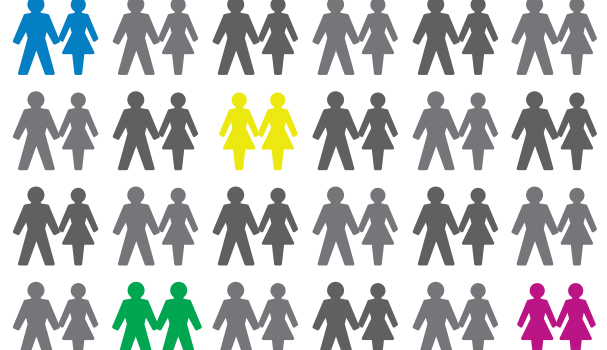Even though attitudes have shifted significantly in recent times, it’s understandable that some are wary about being open about their sexuality, particularly when it comes to sharing in the workplace. But this can come at a significant cost. A recent study by OUTstanding, the not-for-profit professional network for LGBT executives, profiled 200 senior LGBT business figures and found that non-inclusive workplaces have a negative impact on both employees and the business as a whole.
According to the poll, 80% of respondents felt that LGBT professionals who could not openly be themselves would suffer from damaged confidence as a result. A further 86% believed the fear of ‘found out’ causes staff anxiety that could be prevented whilst another 86% felt that this could leave them feeling isolated from their colleagues. Evidently, creating an inclusive workplace can go a long way to dismantling these barriers that prevent a harmonious and positive professional environment.
One of the most interesting findings, however, was the number of respondents who felt that greater boardroom diversity is a key ingredient in creating an inclusive workplace. More than a quarter (27%) felt more openly LGBT executive role models would help other LGBT employees feel more comfortable being who they are, whilst 24% felt greater boardroom diversity would help LGBT employees progress higher in the company. In light of this, we decided to speak to senior LGBT business figures to ask them how they are helping to create stronger and more inclusive workplaces.
Leading by example
Isabella Segal, Nyman Libson Paul
Companies don’t have to have all of the answers when it comes to being inclusive of LGBT employees. “To be honest with you, we didn’t have any experience whatsoever of dealing with inclusivity, so we were sailing in uncharted waters,” says Isabella Segal, a transgender partner at Nyman Libson Paul, an accountancy firm, and member of OUTstanding. But despite not having a clear roadmap for these things, when Segal came out in May 2013 she was amazed at how accepting people at work were. “I sent an email round to all of the staff saying that in a few weeks time I would be coming into work as Isabella,” she says. “Everybody just accepted it as the norm.”
Segal feels there are several benefits to running an inclusive workplace. Firstly, it enables the firm to attract a wider range of talent. “We’re fishing in a pool with lots of other firms to get quality people,” she says. “If they can see that we are inclusive as a firm, we can attract people with broader life experience.” But she also believes that when people don’t have to cover up who they are it can free up a lot of energy. “I spent over 30 years trying to hide the inner person,” she says. “But if you can be accepted then you’re going to feel better and if you feel better you’re going to be more productive.”
And Segal believes there can be a huge benefit to have leaders in the business who are out and open about their sexuality. “I’m fortunate that because I’m quite senior I got treated okay,” Segal says. “For younger people, it must be more difficult.” And this is why there being senior talent in companies who can lead by example can benefit employees; Segal agrees with the 99% of respondents in OUTstanding’s survey that being open about one’s sexuality in the workplace is rarely as traumatic as one might expect. “I would encourage people to come out because it isn’t as bad as you think it’s going to be,” she says.
Taking diversity further
Mark Pearson, MyVoucherCodes
Employees at MyVoucherCodes certainly don’t have difficulty being open about who they are. “Aside from myself, 10% of our employees are openly gay,” says Mark Pearson, founder of the company. The voucher and discount provider has gone to great lengths to make sure its employees feel at home and Pearson is keen to stress this doesn’t stop at being open and accepting of just employees’ sexuality. “We have worked hard to create an inclusive and open environment, not just for LGBT but also for people of all lifestyles, backgrounds, religions and ethnic backgrounds,” he says.
This focus on inclusivity has had no end of benefits for the teams involved, allowing people to come together and form close-knit relationships based on who they really are. “It’s key for us that being friends with colleagues and teammates and feeling like every unique culture and lifestyle is acceptable,” explains Pearson. “It results in a happy team satisfied with the work they are doing.” This helps to add real cohesion amongst MyVoucherCodes teams that he feels can create real communities amongst individuals across teams. “We even organise social events and marketing activities based on our diverse backgrounds,” he continues.
And supporting inclusivity doesn’t just help boost employees’ morale. “MyVoucherCodes provides a wide range of products and services to all types of customer,” Pearson says. “Diverse teams understand their wants and needs and can communicate with the users much more effectively.” Above and beyond supporting employee wellbeing and opposing discriminatory attitudes, inclusion helps secure a diversity of attitude and inspiration that can only strengthen a company. “By having an open discussion with people who have distinctly different viewpoints and backgrounds, you can ensure great ideas come through.” ![]()
Share via:








































